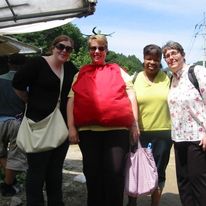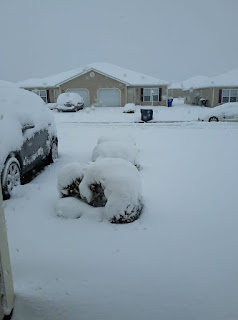Oh My July
July was such a good reading month. I feel as if I got my reading mojo back. It never stays gone, but when it's gone, it feels permanently gone. But it's here, making itself at home and putting its feet up on the coffee table. Whew.
I caught COVID during the 4th of July weekend, which was unpleasant at first, but as I improved, paid off in reading dividends. I was able to plow through my half-read stack while half-sitting up in bed, as Waverly remained close by and basked in the heat of my elevated temperature.
1. Born To Run -Bruce Springsteen. Memoir. Audiobook. Much more rumination than I was expecting from The Boss. He's thoughtful. Thought-Full. Enjoyed his narration of the memoir.
2. James - Percival Everett. Novel. Smart, sly, funny, and subversive. Since I have read The Adventures of Huckleberry Finn, it was interesting to see where the two narratives meet and diverge. I am sure that Mark Twain would heartily recommend this novel. Read this one for the new, no-name book group.
3. Spent - Alison Bechdel. "Comic Novel". A fictional version of Bechdel and her partner live "off the grid" near an idyllic small town in Vermont where their lives intertwine with characters from Dykes To Watch Out For. Now I want to go back and read the whole DTWOF series and get better acquainted with everyone.
4. The Matriarch - Susan Page. Nonfiction. A serviceable biography of Barbara Bush. It's written in a sort of a gossipy style. Good interviews with Barbara Bush and her immediate family and her many friends. My main irritation with the book concerns the biographer: Somehow, Susan Page could not keep herself out of it! I'm of the school that biographers should be like the proverbial fly on the wall. This would involve some use of the passive voice, but so what? It's not all bad, and exists for situations like this one. Read this one for the 3 R's book group. The theme for the month was to pick a first lady and read a book about her.
5. Honey, Baby, Mine - Laura Dern and Diane Ladd. Memoir. Audiobook. A few years ago, Diane Ladd was unwittingly exposed to dangerous pesticides that jeopardized her lung capacity. Doctors told Diane and her daughter, Laura Dern, that Diane didn't have much time, but one doctor said that if Laura could get Diane up and walking, that would improve her breathing, so the two began a series of walks which also became conversations about their lives. Dern recorded the conversations, but listening to the audiobook, I wasn't sure if these were the actual original conversations, or re-creations, because at times, Dern in particular, sounds especially neat and pat. Not to mention that they are both accomplished actors. I'm happy that Dern got her mother walking and talking, and I'm pleased that Ladd got well. I enjoyed all the theatre and Hollywood name-dropping and gossip, but the whole package feels so contrived. I'm thinking in particular of an argument they have towards the end of the book. In addition, I could have lived without the introduction by Reese Witherspoon.
6. Who is Willie Nelson? - David Stabler. Nonfiction. A damn good entry in the Who Was...? series. I enjoyed reading about Willie's early life and his lengthy struggle for success. Also, the author doesn't shy away from Willie's marijuana use, his battles with the IRS, and an extramarital affair that produced a daughter. My only (minor) gripe is that I would have liked to have seen a brief discussion of how Willie developed his distinctive singing style.
7. A Marriage at Sea - Sophie Elmhirst. Nonfiction. In 1973, an English couple, Maurice and Maralyn Bailey were sailing to New Zealand when their boat was smashed by an injured whale. The Baileys had sold their house and built this boat to follow their dreams of adventure. After the encounter with the whale, the boat sank quickly, and the Baileys were soon adrift in a rubber raft with a dinghy attached and a meager supply of food. Their ordeal went on for 118 days, until they were spotted and rescued by a Korean fishing vessel. A year later, they published their account, 117 Days Adrift. (It was actually 118 days, but early reports got the amount of time wrong.) Journalist Sophie Elmhirst, writing in beautiful and restrained prose, covers their ordeal in A Marriage at Sea, but also goes back to the couple's beginnings, when shy, introverted Maurice met outgoing, extroverted Maralyn, and they somehow clicked. Elmhirst also discusses the couple's sudden celebrity after their rescue, their return to sailing. The book comes full circle, and again, it is beautifully composed, and breathtaking in its empathy and insights. It's wonderful and my favorite read for July.
8. Who is Caitlin Clark? -Meri-Jo Borzilleri. Nonfiction. This is one of the 50-pagers in the Who Was...? series, and admittedly, there's not much to say about WNBA star Caitlin Clark, since she's still at the beginning of her career. Reading her origin story was time well spent, and now I won't be so jaw-droppingly ignorant when I see her name in sports news.
In book-related news, I followed the story about Dan Pelzer with great interest. Columbus, Ohio native Pelzer died recently at the age of 92, and left behind a reading log that began back in 1962, and it looks like it went on at least until 2023. .Also, nearly every book Dan logged was checked out from the Ohio Public Library system. His daughter, Marci, posted the100+-page list at what-dan-read.com One of the branches in the Columbus library system has a display of books from Dan's list. In his obituary, it says something to the effect of "in lieu of flowers, go out and read a real page-turner." The more I read about Dan, the more I wish I could have met him.
Do you log your reading? If so, how long have you done so? I've been at it regularly since 1993. (I have a list from 1990, and an incomplete list from 1991.) I love looking back at what I've read, and what others have read. If you haven't started a reading log, please consider doing so. They literally are the stories of our lives.











